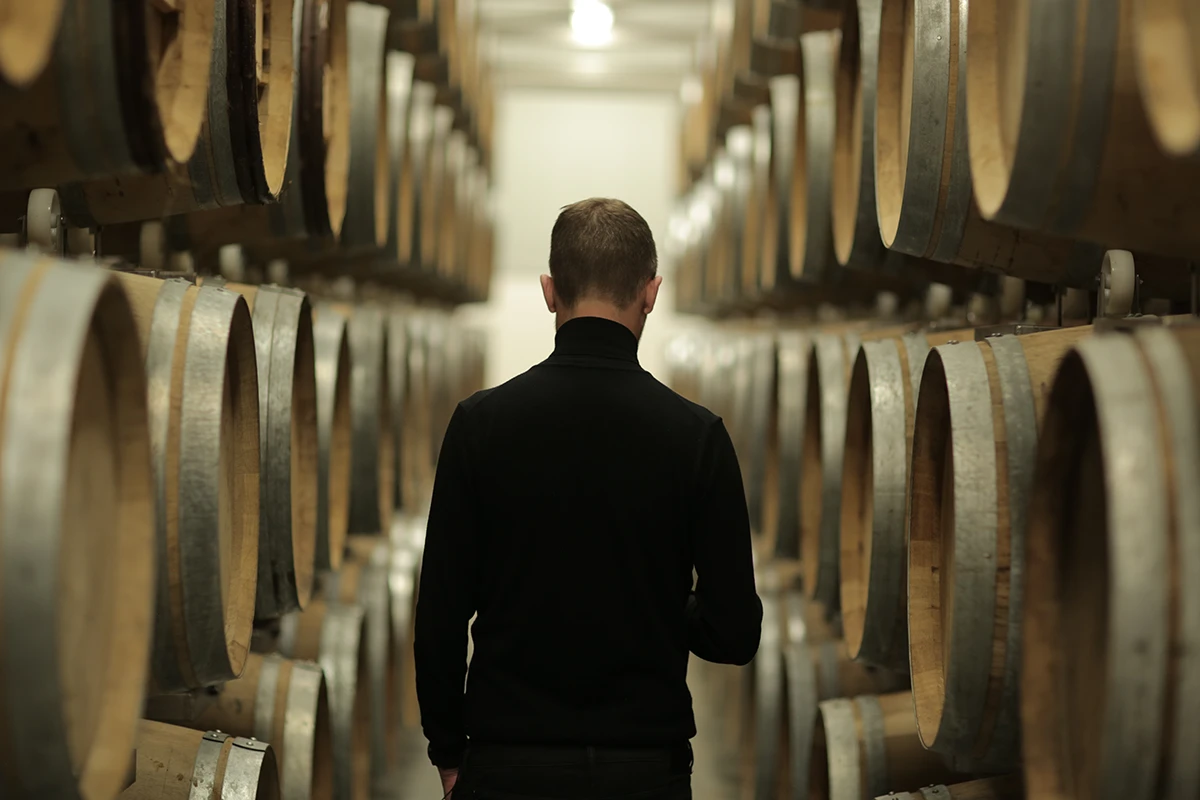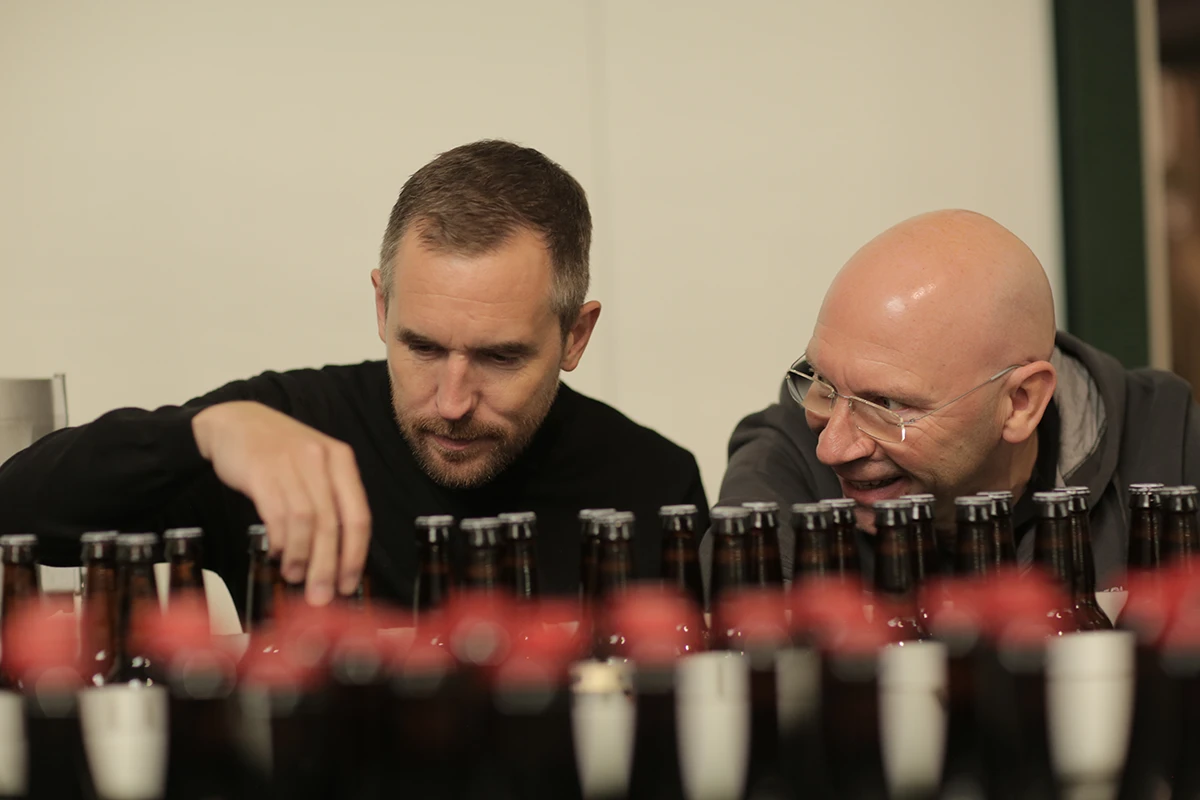
Why our beer
tastes so good
As you have probably discovered, we brew beer: a lot of it, and in many different places. What started out as a home brewing hobby in a school teacher’s kitchen has grown to encompass a large-scale production process in collaboration with different breweries, all of whom possess specific abilities and talents. In the following section you will find information about our collaboration with these skilled and valued partners and about the breweries.

De Proef Brouwerij (Belgium)
De Proef Brouwerij is Mikkeller's closest partner, and the brewery and Mikkeller have grown alongside each other since their collaboration began back in 2007. The close partnership can account for a great deal of both Mikkeller's and De Proef's successes, not least of which includes the constant scientific development of new beers and recipes.
“Dirk [owner of De Proef] is insanely skilled and is one of the best brewers in the world with a huge technical knowledge of processes and raw materials. My creativity coupled with his technical skills and knowledge has meant that we complement each other really well”
Explains Mikkeller founder and CEO Mikkel Borg Bjergsø.
Rewinding to Mikkeller's early years, Mikkel brewed his beer at GourmetBryggeriet in Denmark. But after his breakthrough in 2006 with the coffee stout Beer Geek Breakfast, his brewing career really began to take off. He needed to produce larger quantities of beer, so he started looking around for a brewery that could handle this task. Through his beer distributor, Beer Factory, he heard about a brewery in Belgium that specialized in licensing brewing for others. He contacted owner Dirk Naudts, who along with his wife, Saskia (both of them with a degree in biochemistry and focus on brewing) had started up their own brewery in 1996 with the sole purpose of producing the recipes of other “beer architects”.
The gypsy brewer and the perfectionist brewing engineer The first two beers that De Proef brewed for Mikkeller were Monk's Elixir, a Belgian ale, and the pilsner Draft Bear. When Mikkel was very happy with the results, production of Green Gold and Santa's Little Helper – Mikkeller's first Christmas beer – quickly followed. Mikkel wanted to continue with several new recipes, but initially he and Dirk did not fully agree on the production process. There was a little persuasion involved, says Mikkel.
“Dirk was used to brewing a few recipes, but in large quantities and then leaving it at that. He had a very traditional Belgian approach to beer and was not used to his clients being particularly creative. So, in the beginning, we had some discussions back and forth. But I persuaded him, and as we got started, he himself started to think it was really exciting. We started experimenting and developing beer together. It was the same when I got the idea to barrel age our beers.”
For Dirk Naudts, Mikkel showing up and shaking things up a bit was perfect timing for De Proef. The brewery had been around for over ten years and was prepared to take on the challenge.

“Mikkel was not like the other customers. They did not want to reveal that they brewed with us, but Mikkel stood by it one hundred percent. He said, 'I'm a gypsy brewer, I don't want my own brewery. Instead, I want to look for competent people who can transform my recipe into the kind of beer I like”.
The first major project that Mikkel and Dirk dove into together was the production of a Single Hop Series: a range of 21 beers brewed using the same recipe, but with different hops. De Proef hired PhD student Ann Van Holle, of the University of Ghent, to lead The Single Hop Technology Project. The project aimed to analyze different types of hops from around the world. In this process, they discovered that there was no guarantee that the hops you bought were actually the hops you received. Therefore, Mikkeller and De Proef began to acquire hops directly from the hop farmers. The project has been of great importance to microbreweries around the world, and has raised the requirements for the quality of hops in general.
“Our Single Hop Series is one of the projects in collaboration with De Proef of which I am most proud, because it has meant that both beer drinkers and brewers around the world now actually know what types of hops they prefer, and that beer labels now also indicate which specific hop variety a beer contains. Before, it just said 'hops' on the ingredients list”
Mikkel says.

Like a solid marriage Another project Mikkel is particularly proud of is the range of non-alcoholic beers that Mikkeller and De Proef have produced together. The development of a new yeast strain for this purpose has meant that it has become possible to brew versatile non-alcoholic beers that have lots of flavor and fullness.
“A few years back it was simply not possible to brew an alcohol-free beer that actually tasted of something”
He says.
The Mikkeller Spontan Series, which consists of a large number of barrel aged spontaneously fermented beers, is also worth highlighting as a notable result of Mikkeller's fruitful collaboration with De Proef Brouwerij.
Dirk Naudts describes the collaboration with Mikkeller as a long marriage. After years of experience it has found an unusually solid and stable ground, he says:
“The problems are always solved in a pleasant and good way, and we have reached a point where we fully understand each other and can spend our time concentrating on quality and organization”.
When Mikkeller started brewing at the Proef in 2007, the brewery brewed 10000 hl and had 10 employees. In comparison the brewery brewed 90000 hl in 2019 and now has 48 people working there.
Read more about Mikkeller's collaboration with De Proef Brouwerij here: https://mikkeller.dk/news/mikkeller-launches-a-new-style-of-alcohol-free-beer https://mikkeller.dk/news/mikkeller-launches-terroir-series

Lervig Aktiebryggeri (Norway)
Without question, the most famous beer Mikkeller has ever made is Beer Geek Breakfast. This 7.5% ABV oatmeal coffee stout was the first beer to receive international acclaim. It has since developed into one of our most extensive series, spawning one of our most sought-after beers ever.
The Beer Geek series is mainly brewed in Norway, by the good people at Lervig. The Norwegian water they use for brewing there is perfect for stouts, and over time, Lervig has come to know this beer intimately in all its many iterations, with different ABVs, different variants, different barrel agings.
At Lervig, Philadelphia native Brew Master Mike Murphy exercises his specific skills in the realm of dark beers to perfection. Aside from the fact that his knowledge and mastery of this specific style is an innate talent of his, Mike has also proven time and time again his proficiency in handling the exact specifications of Mikkel's recipes. Essentially, Lervig delivers the most precise executions of the Beer Geek variants that we have experienced.

Mikkeller Brewing, San Diego (USA)
Mikkeller has exported to the US from the beginning and back then it was possible to ship hoppy beers across the Atlantic and still be cutting edge, but it was still no fun for Mikkel Borg Bjergsø to travel to the US and find that his beers were far from as fresh and crisp as they were intended. Local production became a necessity and the decision to take over the brewery Alesmith’s old location was an obvious one, especially with Peter Zien (owner of Alesmith) on board.
The opening of Mikkeller San Diego marked a departure from being solely a so called ‘phantom’ or ‘gypsy’ brewery, as San Diego was our first physical production facility of our own. While the San Diego brewery carries its own line of San Diego-specific recipes, it also excels at creating fresh takes on Mikkeller classics such as the Beer Geek series (including the ridiculously tasty, rum barrel aged Beer Geek Vanilla Shake).

The opening of Mikkeller San Diego also led to the regular availability of fresh, hazy Californian IPAs in Copenhagen. Soon after the opening, the first few cans of Mikkeller San Diego brews made their way across the Atlantic. This was a game-changer: at that time, this style of IPA was still relatively new, and far less omnipresent than it is now. Not many breweries in Europe had really caught on to this trend, which meant that early iterations of the style brought craft beer to a new and broader audience. People who had previously been turned off by the bitterness inherit in classic IPAs could now indulge in the unfiltered juiciness of this fresh, new style.
Over time, Mikkeller San Diego has graduated from mainly producing hazy brews. In fact, Raspberry Blush – one of the early beers – was so well-received, that it was elevated from being a one-time limited release to being inducted into the recurring portfolio of the brewery. Quite different from a California IPA, Raspberry Blush is a Berliner-style weissbier made with raspberries and coffee. Despite the unusual-sounding combination of flavors, the beer works beautifully. The coffee is sufficiently subtle so as to avoid overpowering the berries, and ends up as little more than a delicate undercurrent in the flavor. This elevates the acidity of the beer and highlights restrained flowery notes, producing a nuanced and delicious beer.
Now Mikkeller San Diego proudly brews a wide range of beers in all styles. The brewery also has an extensive collaboration program, which has resulted in many collaborative brews with top breweries in the contemporary craft beer world.

Warpigs Brewpub
When Mikkel Borg Bjergsø started creating bars and restaurants it was very much a way of building a home for the (phantom) brewery, and also quickly became a way of educating Copenhageners (and others) about beer. After opening four bars (two in Copenhagen, one in San Francisco and one in Bangkok) plus a small restaurant called Øl & Brød (Beer & Bread) in Copenhagen – all with strong individual concepts - he started dreaming about starting a true American brewpub in Copenhagen. Many of the restaurants in the Danish capital were very 'new nordic', and Mikkel wanted to do something different, so he turned to his longtime friends from the legendary American brewery Three Floyds and came up with a concept that would turn the Copenhagen beer scene on its head and showcase amazing, hoppy beers to a beer loving audience. In April 2015, Mikkeller & Three Floyds opened their brewpub with Texan BBQ, Warpigs, named after the famous Black Sabbath song.
While Warpigs has earned a solid name for itself in the beer world by producing a steady stream of hoppy winners (brewed on-site – and only on tap), they also boast a line of acclaimed stouts, as well as a cellar full of spent spirit barrels in which to age them.

A large contributing factor to the quality of beer is the mineral composition of the groundwater available to the brewers. At Warpigs, they essentially deconstruct the groundwater used for brewing, and then rebuild it to get the optimal mineral ratio. The goal of this process is to recreate the water used by Three Floyds, located in Munster, Indiana. Just as the water in Pilsen is essential for brewing pilsners, the water near Three Floyds is ideal for brewing hoppy beers.
Warpigs Head Brewer Philipp Heist explains:
“What makes this place special is that it's a small brewhouse with a lot of fermenters. This means that we can brew 8-9 beers a week, and the beauty in this lies in the short distance from the tank to the taps. That gives us an efficient grip on quality. It also means that we have the opportunity to try out crazy things and see if they work. Still though, making the best beer is our prime focus. I mean, we’re really pampered and blessed with the cellar and this location in general, and that, I think, is best for the consumer”.
More about Warpigs here: https://warpigs.dk

Mikkeller Baghaven
The tradition of spontaneously fermented beers has its origins in Belgium, where such beers are known as lambic. This tradition has crossed the bridge from the old world to the new, securing a strong foothold amongst American brewers in recent years.
As lambic is a regional trademark (as is the case with Champagne), beers made in this style outside of the Pajottenland area in Belgium are commonly referred to as 'wild ales,' or simply as spontaneously fermented beers. A key component in the brewing of this style is the process, during which the wort is kept in an open container for about 24 hours. In this time, it will be exposed to airborne yeast and bacteria. The exact composition of these bacteria and yeast strains is absolutely crucial to the flavor that ends up as the backbone of this beer. As such, geographical locations are a point of paramount significance in the production of this style.
A brief history of this style of beer is provided to illustrate just how important it was for Mikkeller – and beer geeks – when we opened Baghaven. Head Brewer and Blender Ehren Schmidt was brought over from the US, and immediately set about finding and isolating local terroir suitable for brewing beer. This marked the beginning of a production facility that would create truly local, truly Danish wild ales: beers that would derive their particular flavor from yeast and bacteria composition that could only be found in Denmark. Baghaven has now established itself as a one of a kind brewery and barrel room with a fantastic location by the water front, a view to the Little Mermaid and some of the most unique wild and sour beers in the world.
More about Baghaven here: https://www.youtube.com/watch?v=bRRXzOH62Is#action=share
Gweilo
Mikkeller was one of the first craft breweries to show a true passion and appreciation for the cultures, cuisine, and beer scene in Asia. As our presence in the region has grown, so has our desire to be able to brew and share some of our favorite hoppy beers there, with production taking place a bit closer to home. Gweilo Beer in Hong Kong has established themselves as an amazing brewery, and is especially highly-regarded for their pale ales and IPAs. Mikkeller and Gweilo share a focus on a high standard of quality as well as a commitment to raising awareness of excellent beer. Brewing in Hong Kong has allowed us to share fresh hoppy beers with a ton of friends and fans – both old and new.
More about Gweilo Beer here: https://gweilobeer.com




